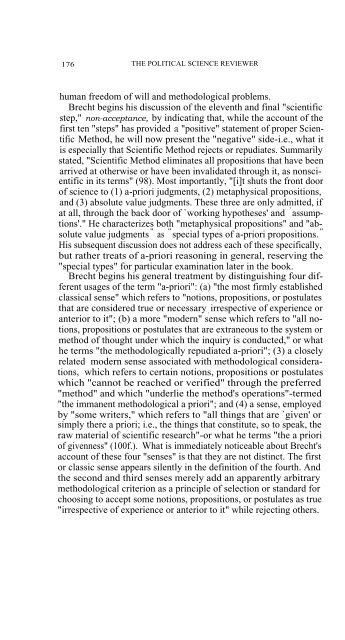ARNOLD BRECHT'S POLITICAL THEORY REVISITED Political ...
ARNOLD BRECHT'S POLITICAL THEORY REVISITED Political ...
ARNOLD BRECHT'S POLITICAL THEORY REVISITED Political ...
You also want an ePaper? Increase the reach of your titles
YUMPU automatically turns print PDFs into web optimized ePapers that Google loves.
176<br />
THE <strong>POLITICAL</strong> SCIENCE REVIEWER<br />
human freedom of will and methodological problems.<br />
Brecht begins his discussion of the eleventh and final "scientific<br />
step," non-acceptance, by indicating that, while the account of the<br />
first ten "steps" has provided a "positive" statement of proper Scientific<br />
Method, he will now present the "negative" side-i.e., what it<br />
is especially that Scientific Method rejects or repudiates. Summarily<br />
stated, "Scientific Method eliminates all propositions that have been<br />
arrived at otherwise or have been invalidated through it, as nonscientific<br />
in its terms" (98). Most importantly, "[i]t shuts the front door<br />
of science to (1) a-priori judgments, (2) metaphysical propositions,<br />
and (3) absolute value judgments. These three are only admitted, if<br />
at all, through the back door of `working hypotheses' and ' assumptions'."<br />
He characterizes both "metaphysical propositions" and "absolute<br />
value judgments " as " special types of a-priori propositions. "<br />
His subsequent discussion does not address each of these specifically,<br />
but rather treats of a-priori reasoning in general, reserving the<br />
"special types" for particular examination later in the book.<br />
Brecht begins his general treatment by distinguishing four different<br />
usages of the term "a-priori": (a) "the most firmly established<br />
classical sense" which refers to "notions, propositions, or postulates<br />
that are considered true or necessary , irrespective of experience or<br />
anterior to it"; (b) a more "modern" sense which refers to "all notions,<br />
propositions or postulates that are extraneous to the system or<br />
method of thought under which the inquiry is conducted," or what<br />
he terms "the methodologically repudiated a-priori"; (3) a closely<br />
related modern sense associated with methodological considerations,<br />
which refers to certain notions, propositions or postulates<br />
which "cannot be reached or verified" through the preferred<br />
"method" and which "underlie the method's operations"-termed<br />
"the immanent methodological a priori"; and (4) a sense, employed<br />
by "some writers," which refers to "all things that are `given' or<br />
simply there a priori; i.e., the things that constitute, so to speak, the<br />
raw material of scientific research"-or what he terms "the a priori<br />
of givenness" (100f.). What is immediately noticeable about Brecht's<br />
account of these four "senses" is that they are not distinct. The first<br />
or classic sense appears silently in the definition of the fourth. And<br />
the second and third senses merely add an apparently arbitrary<br />
methodological criterion as a principle of selection or standard for<br />
choosing to accept some notions, propositions, or postulates as true<br />
"irrespective of experience or anterior to it" while rejecting others.
















